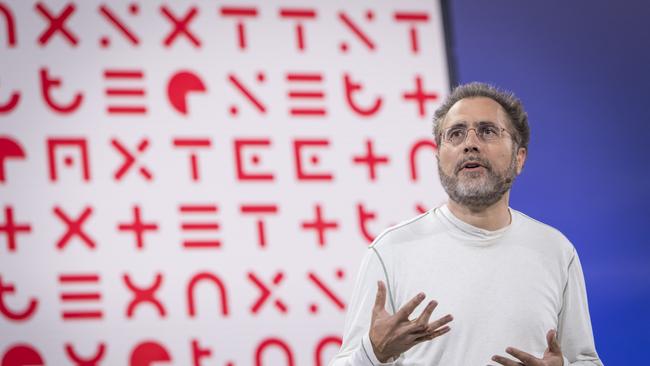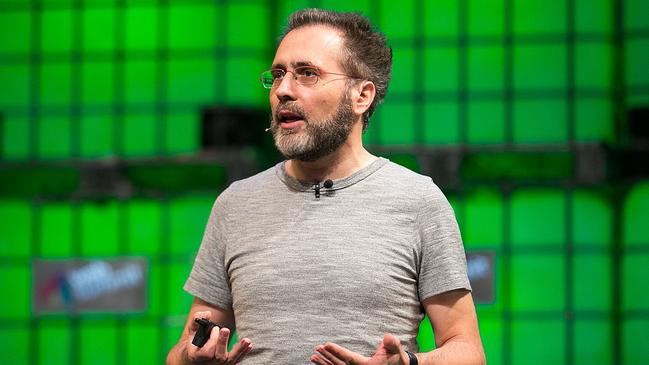Google bidding for AI supremacy
Microsoft is betting big on the wildly popular chatbot ChatGPT, but don’t underestimate Google, according to its eighth ever employee.

Business
Don't miss out on the headlines from Business. Followed categories will be added to My News.
A high stakes battle for supremacy across Artificial Intelligence and cloud computing is brewing between technology giants Google and Microsoft.
Microsoft is set to roll out ChatGPT chatbot across its cloud services and software including Microsoft Office, in direct competition with Google’s own AI effort LaMDA.
ChatGPT, a chatbot from start-up OpenAI, has exploded in popularity in recent weeks and Microsoft, which has invested billions of dollars in OpenAI, is now set to deploy the software across its Office suite and its cloud products.
Google isn’t lying down, however. Urs Hölzle, Google’s eighth ever employee and its current senior vice president of engineering is unfazed, and acknowledges ChatGPT’s rampant popularity but says he remains bullish on the potential of Google’s AI rival LaMDA.
LaMDA is so sophisticated that one of Google’s engineers became convinced it was sentient. The Language Model for Dialog Applications, or LaMDA, has been pre-trained using 1.56 trillion words of conversation data and online pages, but is not yet accessible to the general public. Google has reportedly brought its founders Larry Page and Sergey Brin back for meetings to help refine the tech giant’s AI strategy as competition heats up.
“I would say at a high level, AI right now is at an incredibly exciting point, and for the last five years the trajectory of improvement has been astounding,” Mr Hölzle said in an exclusive interview. “I would expect the next five years to be the same. Maybe you hit a wall at some point, but it is going to be an incredibly exciting time. Language understanding is getting better and better, and you’re seeing that in Google products with things like translation, search, and ads all getting better at understanding.
“We have our internal equivalents of course, but the ChatGPT thing shows that actually generating very correct English not at a sentence level, but a paragraph level, and even a small essay level is very good, and that’s actually not surprising. Our Google equivalent, called LamMDA, shows that the success you have at writing an essay or completing a math problem really grows as you train it more and more. And what’s exciting is that this is still not a solved problem, these systems are very brittle. They can give you a very convincing argument answer that is actually completely wrong. But they’re getting better every single day.”
Google’s challenges today are light years from the early 2000s, the executive said, in which the tech company was a mere search engine provider, compared to the $1.7 trillion behemoth it is now.
“It was very different from today, because actually our biggest problem was, in a way, infrastructure,” Mr Hölzle said.
“Search was about downloading the web, indexing it, and then making it searchable to everyone, which required huge computational storage. And so those first few years were about solving this problem and it was a very short-term focus thing, because we were all about surviving to the next week. Things were breaking along the way and we didn’t have the systems we have today.

“As we got our handle on the basics, we could lift our horizons and actually start solving more problems. That’s the biggest difference between then and today for Google, in the early 2000s we had to deal with the fire of the day, and now we can actually make plans and solve big problems.”
One might assume that for a company that moved as quickly as Google did back then, company culture would be, by necessity, an afterthought. That there were too many fires in need of extinguishing to be able to thoughtfully hire and retain good talent. Mr Hölzle says however that the opposite is true.
“Culture was always a big focus. And at the time, people in their job interview would ask ‘what is the biggest threat to Google’, because it was a small company, it wasn’t profitable, and my answer was ‘growth’. And I meant organisational growth, not traffic growth,” he said.
“Most companies that expand quickly fail, because they hire the wrong people and get the culture wrong and then afterwards nothing works. And once you realise that’s your most important problem, and you have smart people who care about it, these things tend to work out. People say that culture eats strategy for breakfast, and it’s true.”
The cloud industry has been crippled by lay-offs over the past 12 months, with Salesforce, Microsoft, Amazon and Google parent company Alphabet axing thousands of staff collectively. Alphabet said last week it needed to downsize after hiring too quickly in the pandemic, but would be doubling down on artificial intelligence efforts.
While not commenting on recent lay-offs, Mr Hölzle points to the industry-wide growth in cloud computing over recent years, which he predicts will inevitably accelerate between now and the end of the decade.
“We have two [cloud] regions right now in Australia, and there are very few countries outside the US where we have two regions or others have two regions, so that shows you how successful we’ve been [in Australia],” he said.
“We’re not on day one, I would say we’re on day three of a month-long journey to the cloud, so to speak. The majority of the cloud hasn’t been invented yet, and 2025 will hopefully make the cloud today look lame, and the cloud in 2030 will make today look super lame.
“I actually see more opportunity in APAC than in the US, because overall there’s more demand there.”
More Coverage
Originally published as Google bidding for AI supremacy





